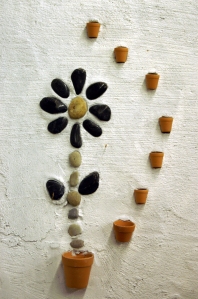Elegy
1. Adrift
I count more graves than people in my sleep,
but nothing turns more quickly
than an empty wind
in a place whose memory has died.
And all manner of departure: What you have left is you
without you. As if it could be different, as if decades
could withdraw and draft a blueprint of motive and action,
returning them, returning you, to that point
across the sea where the ship has not yet arrived.
If you ask she will say it does not matter. If you ask.
2. Parentheses
To be within, yet without, as in the unuttered phrase.
It is time the stone made an effort to flower,
to render the void clear and resolute, the diction of
separation divided by decades and your ocean.
The language of silence, drawn near.
3. From the Other Side
Sometime becomes never and steps around a desolate corner,
and all we have left is our field
awash in stone, remnants of the unspoken.
I have no memory of you. Nor you, of me,
but the strands do not lie, and unraveled,
expose the imperfect blends
that compose my love. A leaky roof. The last word.
A pity to put up at all
but there is rain.
4. Another Night
Of all the hours which were the longest?
The earth trembled around me
and I lay still, bearing witness to
the uncertain malice of its
shrug, shoulders brought to
fore, then returned,
and finally, released. If,
after this half-century, words
could reform in your mouth,
what denial would issue?
Ashes, washing ashore.
5. Bridge
And seeing you only as the shadow of an
ending whose voice lies
in an uncommon past, how
may we recognize the very shape we share?
The bridge’s fate is loneliness,
knowing that one side
decries the other’s
call, that separation affords new light:
they are between
comfort and space, between words and a smile,
between nothingness and sorrow,
two points, beginning and end,
reaching, in opposition, towards each other.
Notes:
“What you have left is you without you” is from Edmond Jabes’s “At the Threshold of the Book” in The Book of Questions: Volume I, translated by Rosemary Waldrop.
“It is time the stone made an effort to flower” is from Paul Celan’s poem “Corona,” included in Poems of Paul Celan translated by Michael Hamburger.
“A pity to put up at all but there is rain” is from Basho’s Back Roads to Far Towns, translated by Cid Corman and Kamake Susumu.
Albert Huffstickler’s poem “Bridges” which appeared in The Balcones Review in 1987, begins “They are between…”
“Elegy” first appeared on Underfoot Poetry in October 2017.


I really enjoyed reading this ❤
LikeLiked by 2 people
Thank you, Scarlett. Much appreciated.
LikeLike
You’re welcome 🙂
LikeLiked by 1 person
i love this, especially ‘adrift’
LikeLiked by 1 person
Thank you, Beth. This one took a long time to complete.
LikeLiked by 1 person
I’m deeply enamored with this piece, particularly with the way the whole pregnant-yet-stifled concept of “unspoken” seems to form its crux. Wow!
Also, though the devastating lamentation that “the bridge’s fate is loneliness” epitomizes the experience of loss, I recognize this fate, by definition, to be “shared” — for all the meager (if not cruel? I dare say we poets require a certain measure of cruel…) comfort such notions are worth… Well, they’re absolutely worth writing about, and you’ve done so masterfully here.
LikeLiked by 2 people
I heard the Huffstickler poem at a reading, probably in 1986 or 1987, and it stayed with me and inspired, at least in part, this piece, which I began in the late 1990s. Some things take a little time…
LikeLiked by 1 person
I don’t know this poem! Could you point me to it?
LikeLiked by 1 person
As far as I know, it’s not available online. I’ll dig up my hard copy (somewhere, somewhere) and send it.
LikeLiked by 1 person
After three readings I am still absorbing the depths of this one
LikeLiked by 1 person
Thank you, Derrick!
LikeLiked by 1 person
This was awesome, Bob.
LikeLiked by 1 person
Thanks very much, Randy.
LikeLiked by 1 person
🙂
LikeLiked by 1 person
Pingback: a grumpy gift: Elegy — O at the Edges | hands in the garden
Calming and beautiful, Bob.
LikeLiked by 1 person
Thanks, Sudhanshu!
LikeLiked by 1 person
It’s not possible for me to get my head or heart around this. I feel it is I who has died. Not one for me. Chris T.
LikeLiked by 2 people
That’s quite all right, Chris. Not every piece resonates for everyone. Thanks for commenting.
LikeLike
This is just so amazing! ♥️
LikeLiked by 1 person
Thank you, Zaroya!
LikeLiked by 1 person
I am so taking screenshots of this and posting on my Instagram. I need to give you credits. What’s your Instagram?
LikeLiked by 1 person
I don’t have an Instagram account, but please credit Robert Okaji. Thank you.
LikeLiked by 1 person
Okay sure. ♥️
LikeLiked by 1 person
🙂
LikeLiked by 1 person
So beautiful
LikeLiked by 1 person
Thank you, Miriam. Much appreciated.
LikeLike
Lovely piece, Robert. I especially liked the phrase “what you have left is you without you.”
LikeLiked by 1 person
Thank you, Dianne. That was a Jabes line. It just wouldn’t leave me alone, so I incorporated it.
LikeLiked by 1 person